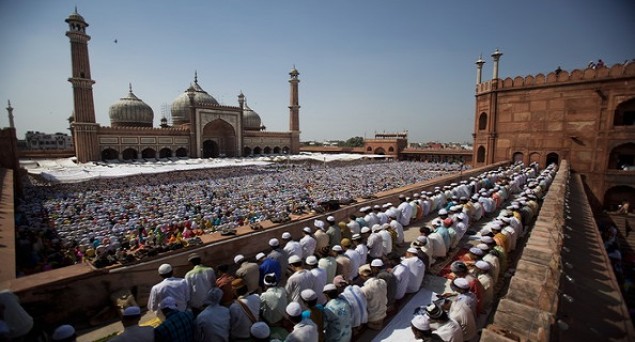Women's Entry In Mosques: Supreme Court Notice To Centre, Muslim Personal Law Board
India Tomorrow
NEW DELHI, OCTOBER 26— The Supreme Court of India on Friday asked the central government to file response on the plea of a Pune-based Muslim couple seeking entry of Muslim women in all mosques in the country.
A top court bench comprising Chief Justice Ranjan Gogoi and Justices S.A. Bobde and S.A. Nazeer sought response from the government and listed the matter for November 5.
The court was hearing the plea filed by Yasmeen Zuber Ahmed Peerzade asking the apex court to declare the prohibition on entry of women inside mosques as "illegal and unconstitutional" as it violated the fundamental rights guaranteed under the Constitution.
The petition has also mentioned that in mosques where women are allowed, there are separate entrances and enclosures for worship for the two genders.
The petition said that there should not be any gender discrimination at all, and that all Muslim women should be allowed to pray in all mosques, cutting across denominations.
In April this year, the Supreme Court had issued the same notice to the central government and All India Muslim Personal Law Board and others on the plea of the Muslim couple. They respondents included union ministries of Women and Child Welfare, Law and Justice and Minority Affairs besides the National Commission for women.
On Friday (Oct 25), the top court ordered that the notice along with copy of the petition be served on the Maharashtra State Board of Wakf, Central Wakf Council and All India Muslim Personal Law Board also.
In April, the top court had admitted the plea of Pune-based Muslim couple saying it will examine the issue in the light of its verdict in the Sabarimala temple case. The top court had overturned ban on entry of women in the 10-50 years age group to the temple in Kerala, leading to violent protests by supporters of the temple tradition.
The petition by the Pune Muslim couple pleaded that Muslim women be allowed to enter and offer namaz inside mosques across the country.
They asked the apex court to declare the ‘prohibition’ on entry of women inside mosques in the country as "illegal and unconstitutional" as it violated the fundamental rights guaranteed under the Constitution.
Pointing out that there was no mention of any gender segregation in either Quran or Hadith, the couple's counsel Ashutosh Dubey said: "....such practices are not only repugnant to the basic dignity of a woman as an individual, but also violative of their fundamental rights..."
The petitioners said that there were no records stating that the Quran and Prophet Muhammad opposed women entering mosques and offering prayers, and in fact men and women have equal constitutional rights to worship, according to their beliefs.
At present, women are allowed to offer prayers at mosques under the Jamaat-e-Islami Hind and Mujahid denominations but they are barred from mosques under the predominant Sunni faction, said the petition.
The petition also mentioned that in mosques where women are allowed, there are separate entrances and enclosures for worship for the two genders.
The petition said that there should not be any gender discrimination at all, and that all Muslim women should be allowed to pray in all mosques, cutting across denominations.
The petition also alluded to the practice in Mecca, where "the faithful, both men and women, together circumambulate the Kaaba". Besides, most sacred mosques in the world equally embrace both men and women, the petitioners said.
To support their argument, the petitioners cited the recent Supreme Court judgement allowing the entry of women in Kerala's Sabarimala Temple.
"The hon'ble court in the case of Sabraimala held that 'religion cannot be used as cover to deny rights of worship to women as it is against human dignity'. Prohibition on women is due to non-religious reasons and it is a grim shadow of discrimination going on for centuries," the petitioners said.
In the Sabarimala case last year, BJP has publicly expressed its displeasure over the SC verdict.
BJP President Amit Shah had said that the Supreme Court should not pass verdicts that conflict with the religious faith of the people and can't be implemented on the ground.
He had also warned the Kerala government led by Chief Minister Pinarayi Vijayan to be ready to face the consequences of targeting Lord Ayyappa devotees. The Kerala government was just implementing the top court order.
--- With Inputs From IANS







You might like